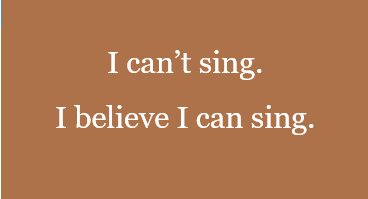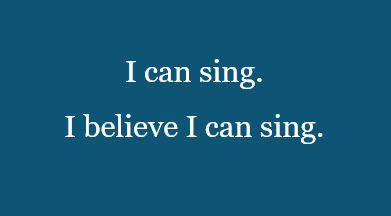Beliefs–what a person holds to be true or real, whether true or real–are the basis of a powerful paradox of the human existence. A classic tale that demonstrates this is Hans Christian Andersen’s, The Ugly Duckling. Accidentally hatched in a barnyard, the Ugly Duckling was bullied because he didn’t look like the other ducklings. He spends his young life wandering and looking for acceptance, but he experiences the same abuse wherever he goes. As a result of these experiences, he learns to believe he will forever be alone as an unlovable creature. However, after he matures, he discovers who he was all along…a beautiful swan.
Beliefs are commanding catalysts.
beliefs are influential inhibitors.
What you believe drives the actions you take (or don’t take). Take a look at the matrix below. On the horizontal line of the graph (the x-axis) is “Don’t Believe” and “Believe.” On the vertical axis (the y-axis) is the root of what you believe about any action, “Can,” and “Can’t.” Fill in the blank with any action you’re considering — lead a team, overcome adversity, learn a language, lose weight, run a marathon, write a book, go back to school.
You get the point.

Let’s look at an example — SINGING:


In the 1997 movie, My Best Friend’s Wedding, Julianne (played by Julia Roberts), tries to sabotage the engagement of her best friend, Michael (played by Dermot Mulroney) to Kimberly (played by Cameron Diaz). One of the many ways Julianne tries to get between the happy couple occurs when she convinces Kimberly to sing karaoke, knowing that Kimberly was a terrible singer. Surely that would make Michael question their engagement!
Thing was, Kimberly also knew she was a terrible singer, didn’t care, and sang anyway…making her even more endearing to Michael.
The long running show, American Idol, has become an icon of American pop culture and launched the careers of stars such as Kelly Clarkson, Jennifer Hudson, and Carrie Underwood. They can definitely sing!
American Idol season openers aired the auditions and were often the most entertaining episodes. Hopefuls who believed they could sing but couldn’t were entertainment fodder for the American audience. Some hopefuls accepted the judges’ rejection with defeated resignation. However, others refused to hear the judge’s feedback because they believed so strongly. They usually left the show screaming, crying, and making a big scene.



Evident of the popularity of shows like American Idol and The Voice, the 2016 animated movie, Sing, was based on a singing competition. Buster Moon (voiced by Matthew McConaughey) launched the competition in an effort to save his beloved, but failing, theater.
Meena, voiced by Tori Kelly, liked to sing (when she was alone) and she auditioned for the competition at the urging of her family. Her lack of belief in her ability, however, led to crippling stage fright, so Meena became the stage manager instead.
Through the encouragement of others in the competition, and as a last resort to save the theater, Meena finally had to step outside her comfort zone and sing in front of an audience. The experience of their applause changed her belief, and the unsuspecting star of the show is born.
One person never afraid to perform on stage was Farrokh Bulsara. He believed he could sing, even when others didn’t. We know Farrokh as Freddy Mercury, lead singer of the iconic band QUEEN. With one of the world’s most recognizable voices, Freddy’s firm belief and incredible ability propelled him to become one of rock’s most known and loved front men of all time.


why does the Beliefs Paradox matter?
Obviously, the “Believe and Can” quadrant of the matrix is ideal…especially if the “can” is related to a worthy goal which you care about deeply. The “Don’t Believe and Can’t” quadrant can actually be fun and freeing — allowing you to enjoy a night of karaoke without worrying about what others think. The “Believe and Can’t” quadrant is a difficult place to live. Sometimes we have to bravely and honestly assess our abilities or genetic limitations. The “Don’t Believe and Can” quadrant can be the most crippling, especially if you have a talent or a special gift.
The combination of belief and ability enables your capacity for achievement and accomplishment. The combination matters. One without the other is less powerful.
Belief without ability can only take you so far.
Ability without belief will keep you from going far.
Ability can be developed. Beliefs can be changed.
- What beliefs do you hold that are leading to your success?
- What beliefs do you hold that are paralyzing you?
- What abilities do you have that need to be developed?
- What abilities do you not have that need to honestly evaluated?
By considering the Beliefs Paradox, I hope you find your inner swan.



